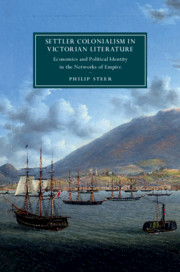
- Cited by 10
-
Cited byCrossref Citations
This Book has been cited by the following publications. This list is generated based on data provided by Crossref.
Sussman, Matthew 2021. Stylistic Virtue and Victorian Fiction.
2021. Decadent Ecology in British Literature and Art, 1860–1910. p. 261.
2021. Convalescence in the Nineteenth-Century Novel. p. 228.
2021. Stylistic Virtue and Victorian Fiction. p. 260.
2022. Visual Culture and Arctic Voyages. p. 269.
2022. Music and the Queer Body in English Literature at the Fin de Siècle. p. 278.
Birchall, Matthew 2023. Mobilizing Stadial Theory: Edward Gibbon Wakefield’s Colonial Vision. Global Intellectual History, Vol. 8, Issue. 4, p. 491.
Garza, Ana Alicia Burke, Lois Snailham, Fiona Blackburn-Daniels, Sally Hind, Heather and Baker, William 2023. XIIIThe Victorian Period. The Year's Work in English Studies, Vol. 101, Issue. 1, p. 789.
Comyn, Sarah and Fermanis, Porscha 2023. Rethinking nineteenth-century literary culture: British worlds, southern latitudes and hemispheric methods. The Journal of Commonwealth Literature, Vol. 58, Issue. 2, p. 409.
Steer, Philip 2024. The Palgrave Handbook of European Migration in Literature and Culture. p. 19.
- Publisher:
- Cambridge University Press
- Online publication date:
- December 2019
- Print publication year:
- 2020
- Online ISBN:
- 9781108695824
- Subjects:
- Literature, English Literature 1830-1900


